5. Eastern Condors (1987)
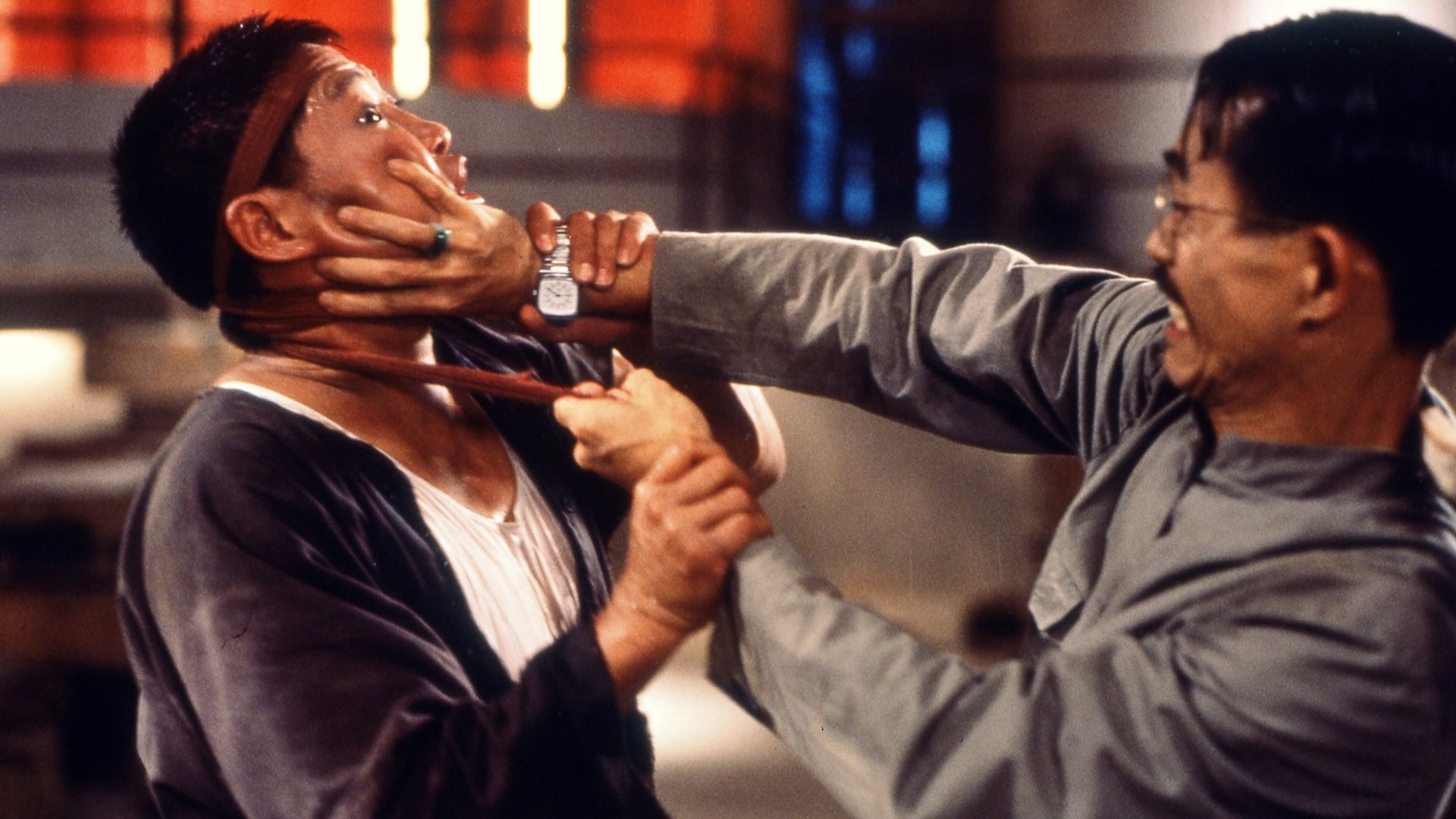
Sammo goes full on ‘War’ film in this stunning actioner made whilst at the peak of his powers. With shades of The Dirty Dozen and The Deer Hunter, this is Sammo’s take on that classic ‘men on a mission’ movie subgenre.
While still delivering in the usual flair of irreverent comedy and insane stunts and fighting, this film has an altogether darker tone than his proceeding movies, one of the main reasons it bombed at the Hong Kong box office.
Sammo himself never looked leaner in a role, forcing himself into a strict diet and workout regime, even going so far as padlocking his fridge door to curb his insatiable eating habits! Again, this is another contender among Sammo fans as his crowning achievement. The fact that this is number five on the list speaks volumes about the man’s genius.
Like The Dirty Dozen, we are introduced to a ragtag squadron made up of prisoners on a do or die mission, with the promise of a full pardon upon completion. Headed by Lam Ching Ying (of Mr Vampire fame) the team are dropped behind enemy lines in Vietnam to locate an abandoned US weapons base, and blow it up before it falls into the hands of the Vietcong.
Just before the ragtag squad land in Vietnam we are introduced to 3 female assassins, the leader of which is played by Sammo’s then girlfriend Joyce Godenzi, (Godenzi and Hung would go on to marry in 1995).
Sammo got the inspiration for these characters while watching the end sequence of Stanley Kubrick’s Full Metal Jacket. He was thrilled when the invisible and sinister sniper, who takes out the Americans one by one, turns out to be a young pixyish female with pigtails and a machine gun, a look he stole wholesale for his 3 female assassins.
Along the way they team up with local wise guy hustler Man Yen Chieh, played with theatrical flair by Yuen Biao (with a ‘New Romantic’ side~parting!) and his mentally challenged uncle played by Haing S. Ngor, Ngor had won the Acadamy Award for his supporting role in The Killing Fields in 1985, based on the Khmer Rouge regime/Cambodian civil war of the 1970’s, in which Haing Ngor himself was imprisoned and tortured, eventually managing to flee to the united states. It’s not very often you see a Hollywood Oscar winner appearing in a Hong Kong exploitation movie.
Our ragtag team covertly travel through the country towards their destination, hot on their heels is a sinister army squadron under the command of our arch villain played by the ever entertaining Yuen Wah, here at his show stopping best as a weaselly hiccupping psychotic camp army general (with a Hitler hairdo!). Not until the last reel does Wah step up to fight, and when he does it’s equally funny, freaky and exhilarating.
In one scene reminiscent of The Deer Hunter, our heroes are captured and forced to play Russian roulette, only this time their tormentors are young children of the Vietcong, coldly executing the prisoners for their own amusement.
With camp comedies being the order of the day/main box office draw in Hong Kong, it’s no wonder this dark and bloody film bombed at the box office.
As they locate the missile silo there is the inevitable astounding showdown, with Sammo’s gang of ne’er do well’s verses the entire squadron of the giggling general, a blistering and ballistic brawl of epic proportion.
A point worth noting here is the music which accompanies the action in these scenes was used by Quentin Tarantino in Inglorious Basterds, which pays direct homage to Eastern Condors in a show stopping slow motion shot where one of the Basterds kills a Nazi guard at the French cinema in the last act of that film. Tarantino is a self proclaimed Hong Kong film obsessive.
A great film to introduce an unknowing friend to Hong Kong cinema.
4. The Prodigal Son (1981)
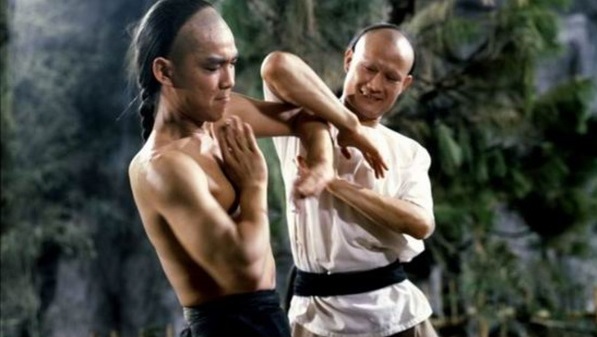
Sammo’s second Wing Chun movie and a prequel to Warriors Two, this time portraying real life Wing Chun master Leung Jan as a young man.
Mollycoddled by his ultra rich parents, Leung Jan is a spoiled brat, totally oblivious to the fact that his opponents are being bribed to challenge him to fights which they purposely lose, leading him to believe he is the supreme martial artist of Canton! (in respect of the real life historical figure that is Leung Jan, this portrayal is entirely dramatic and fictitious!).
The farce is eventually exposed when he encounters Leung Yei Tai (played with camp thespian charm by Lam Ching Ying in his first major role). Yei Tai gives him a painful and humiliating beating and Leung Jan vows to amend his ways and learn the art of Wing Chun, but not before using his fathers wealth to buy the entire opera troupe Yuen Tai performs for, and attempts to shamelessly bribe him for tutelage!
This film comments on the way wealth and purchasing power blinds one to the value and essence of what is truly worthwhile, and how redemption and grace is possible with discipline and dedication, though maybe I’m waxing too philosophical about a film in which grown men beat repeatedly beat each other up, albeit in a most impressive and theatrical manner!
Owing to the fast and direct method the Wing Chun style employs, Sammo takes the action up several notches in terms of speed and precision, in a marked departure from the genres usual long takes and conservative framing, a faster paced method of editing, camera work and choreography were already coming into affect on the scene in the early 80’s, and Sammo naturally adapted to the changing style and showed all contenders how it’s done.
As far as authentic renditions of the Wing Chun style, The Prodigal Son may be the pinnacle in terms of its chorography. Being 1981, this was one of the last of the great old school kung fu movies of the classical era. The traditional martial arts film had almost run it’s course, and at this point was being well and truly knocked out of the water by modern day action films, such as Jackie Chan’s smash hit Police Story released in 1985.
Incidentally this was also the same year the Shaw Brothers classic 8 Diagram Pole Fighter cam out, considered by many to be the last true masterpiece of the old school kung fu film.
The Prodigal Son is yet another strong contender for Sammo’s greatest directorial effort. There have been some interesting and edifying debates online as to whether this or Warriors Two is the greater of his 2 Wing Chun movies, but the result is almost always split down the middle.
Beside, sbetter or worse doesn’t fundamentally matter, both were made while Sammo was at the peak of his powers. The actual number one Sammo Hung film may very well be interchangeable with the first 7 on this list!
3. The Victim (1980)
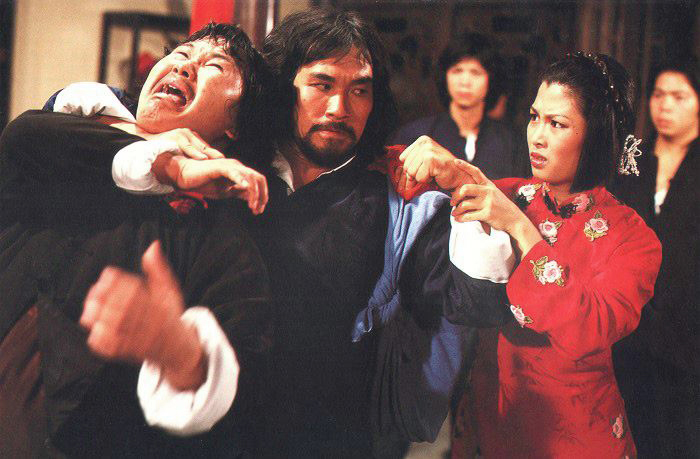
An equalled (though never bettered) old school classic from Sammo Hung.
While keeping with the usual tropes of the genre, Sammo took this one further by making the story, drama and emotion far more engaging and interesting than the average run of the mill ‘chop socky’.
Sammo plays Chang Wing, a simple and arrogant country bumpkin, who bandies about the town challenging local kung fu masters in search of a worthy opponent.
One of these early fights features Sammo wielding a three section staff with stunning agility, leaving one wondering why he didn’t wield this beast in more films.
During one of his daily excursions of arrogant posturing, he comes across Yan Leung (played by Leung Kar Yan, in his greatest acting performance), who deftly defeats Chang Wing. This results in the usual trope of the proud fighter now defeated pleading and following his victor around, playing servile pest, until this potential master finally relents and accepts him as a pupil.
Chang Wing very soon becomes embroiled in an old family feud that is slowly revealed between Yan Leung and his rival, older and sinister stepbrother Jo Wing (played by Chang Yi at his menacing best). It is revealed (via flashback) how Chang Wing’s stepbrother attempted to rape his brother’s bride during their wedding!
Several intriguing subplots bob and weave throughout, culminating and revealing themselves in the final act, which is one of the most intense and enthralling end-bouts in Kung Fu cinema history, with bucket loads of ’emotional content’.
After an incredible duel with Wilson Tong, aka ‘The Foot Doctor’, named thus by British fans (we seem to have a penchant for nicknaming our kung fu heroes), Leung Kar Yan was likewise awarded the title ‘Beardy’! Probably born out of someone saying “There’s that bearded geezer from The Thundering Mantis!”. Apparently in Jamaica they call him ‘The Brigadier’!
Well, the Bearded Brigadier dispatches a small armies worth of his evil stepbrother’s goons simultaneously, after gracefully giving them the option of leaving to spare their lives. It’s interesting how Yang Leung isn’t blinded by his vengefulness, but he sure as hell is seeking the blood of his estranged kin!
This is the battle we’ve been waiting for, and when the showdown with his stepbrother gives way it does not let up, they kick ten bells of crap out of each other! The fact that we are privy to the weight and karma of all previous events leading up to this score-settling moment gives the action an extra dimension of intensity and resonance. If this doesn’t leave you reeling, you are indeed one of the walking dead.
A great independent feature of top-notch bone-crunching mayhem from the maestro of martial arts films.
2. Warriors Two (1978)
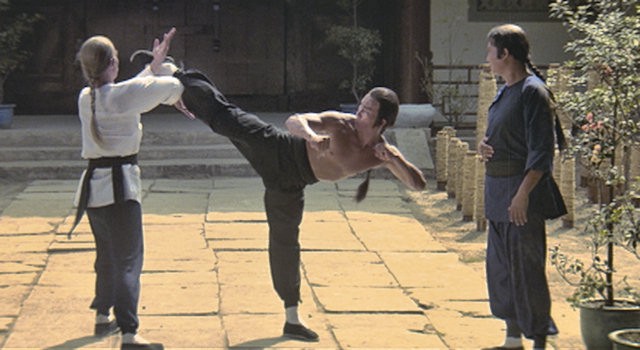
Ask any Old School Kung Fu film fan to compile a top 10 list, and Warriors Two will invariably be in there somewhere. On forums throughout cyberspace, fan gatherings and drunken pub conversations (and in the pages of fanzines and magazines last century!) fans argue the merits of Warriors Two and Sammo’s other Wing Chun classic The Prodigal Son as the crowning jewel in his directorial crown.
It’s all a matter of personal taste of course, but part of the joy and the passion (and at times rabid fanaticism!) of these subcultures is arguing (in good faith) your god given reasons as to why this or that kung fu movie is the superior flick. It’s a child and indishulgent pastime that never gets old.
Warriors Two itself is set in a time long after events of The Prodigal Son occur. As a wizened old white haired master, Leung Jan is now portrayed as a respected and dignified member of his community, living in peace and decorum during his autumn years. A far cry from the brazen naive fool of his youth as portrayed in The Prodigal Son.
The wonderfully named Casanova Wong plays a bank cashier who overhears the plans of an assassination plot on the town mayor, the details of which he mistakenly ends up revealing to one of the gang members involved in the plot! The gang proceed to lure him into a trap, where they attempt to snare and kill the witness to their nefarious plans.
Though he doesn’t get out unscathed, ol’ Casanova manages to slip away, legging it back to town where he fortuitously bumps into our man Sammo, who takes him to the refuge of Wing Chun master Leung Jan’s school.
The cashier spends his subsequent days convalescing, during which time the sadistic thugs murder the cashiers poor mother to lure him out of hiding! Sammo manages to hold him back, and convinces his master to teach him the ways of Wing Chun. I mean, past John Wick avenging his dead dog, the next most fundamental bond in life is your own mother right?!
As cheesy as these old movies are perceived to be (rightly or wrongly), the truly great ones are anchored by an authentic drive and justification for the violence.
Sammo really set a new precedence in his fight chorography with this one. Coming off the back of a feature on his debut The Iron Fisted Monk released the year before. Sammo was now well versed and wiser in the ways of directing.
Utilising the lessons he’d learned and the style he’d honed in his previous project, Sammo truly nails it here, upping the ante and raising the bar high for all other would be contenders in the industry.
Needless to say the end brawl is earth shatteringly astounding! No matter how many times you watch this, it leaves your senses reeling and jaw firmly smashed onto the floor. It’s also worth noting how Sammo always knew talent when he saw it; Casanova Wong never looked or fought better in any other film.
Regular old school villain Fong Hark On (who appeared alongside Sammo in the Ip Man sequel 30 years later) is at his nasty menacing best here. When his character steps up to fight in the final reel it’s a surreal, brutal and hilarious performance all at the same time.
Another thing these old school flicks seem to have in spades are women fighting alongside the men as equals, not as a political or ‘woke’ statement, such things were far from in vogue in the 70’s, women have just always been kicking ass in Hong Kong films since time immemorial.
1. Encounters Of The Spooky Kind (1980)
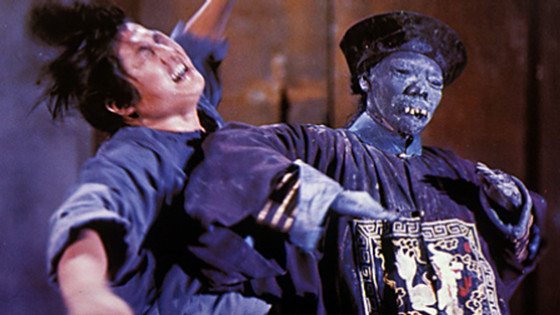
Many previous Hong Kong movies had attempted to blend kung fu and the supernatural before this, most notably Liu Chia Liang’s The Spiritual Boxer in 1975, but Sammo’s ground breaking supernatural Kung Fu comedy was a real trail blazer, and pretty much set the future template for the industry.
Encounters Of The Spooky Kind was among the first to showcase many of the motifs that would become the staple of the Hong Kong action/comedy/fantasy/horror genre; crazy Taoist priests in their yellow robes; magical Chinese rituals (with burning incense, paper charms, sticky rice and chicken’s blood!); female ghost sirens; oriental ghouls; kung fu zombies, and last (but not least) – The Hopping Vampire!
It could be argued that Sammo himself spawned an entire sub genre, known as the ‘Jiangshi’, which truly came to prominence in the hugely successful Mr Vampire (1985) that Sammo himself produced (under his own Bojon film company). Mr Vampire would go on to spawn several sequels and endless knock offs and imitations, with Sammo himself appearing as a cameo in the third instalment.
Encounters Of The Spooky Kind opens with our main protagonist ‘Courageous Cheung’ having a seriously spooky nightmare, chased by 2 monstrous ghouls that live in jars! As they begin to eat him alive Cheung awakes and crashes out of bed!
By day Cheung is the gofer for his rich boss Mr Tam. Mr Tam also just so happens to be banging Cheung’s wife behind his back, something which he eventually tires of, deciding instead to just have Cheung killed and be done with it!
Being the proverbial slime ball that he is, Mr Tam hires an assassin to do his dirty work for him. In this case a corrupt and money hungry Taoist priest (played by Sammo regular Lung Chan) who is employed to curse and dispatch Cheung at a distance with black magic and voodoo spells.
Luckily, the evil priests younger and morally sound brother (played by another Sammo regular Chung Fa) overhears his siblings insidious plans, and seeks out Cheung to weave protection spells and plan a counter attack against his evil brother.
This sets the scene for a magical war between the 2 Taoist priests, talk about siblings squabbling!
Whilst this is taking place, Cheung is framed for the murder of his adulteress wife and is now wanted by the law! On the run from the local police chief (played by future Mr Vampire himself Lam Ching Ying) he encounters ghouls, ghosts, zombies and all sorts of sordid supernatural shenanigans that are equally scary, thrilling, absurd and hilarious.
Once the action begins the film barely lets up, and if you think it couldn’t get more absurdly hysterical we are treated to a last act that is one of the most hysterical, surreal, slapstick and mind blowing acrobatic and esoteric kung fu battles in film history!
Fighters are possessed by monkey gods and goddesses, the Taoist priests invoke demonic forces and speak in tongues, voodoo dolls are brandished, chickens are sacrificed, evil deities summoned.
It is here that Sammo also reveals what an astounding acrobat he is when he is possessed by the monkey god, to see him execute such breathtaking physical feats when you consider his portly size is truly astounding.
A wonderfully entertaining cacophony of non stop surprises, action scenes and slapstick gags. This masterwork tops what is a pretty damn flawless top 10. One which many fans will argue over endlessly. Please do share your own top tens in the comments below, all anecdotes and criticisms are most welcome.
And if you haven’t seen any of these films, please do yourself a favour and delve into the work of one of the most visionary and pioneering masters of the history of Hong Kong movies and action movies in general. The Bossman Sammo Hung!